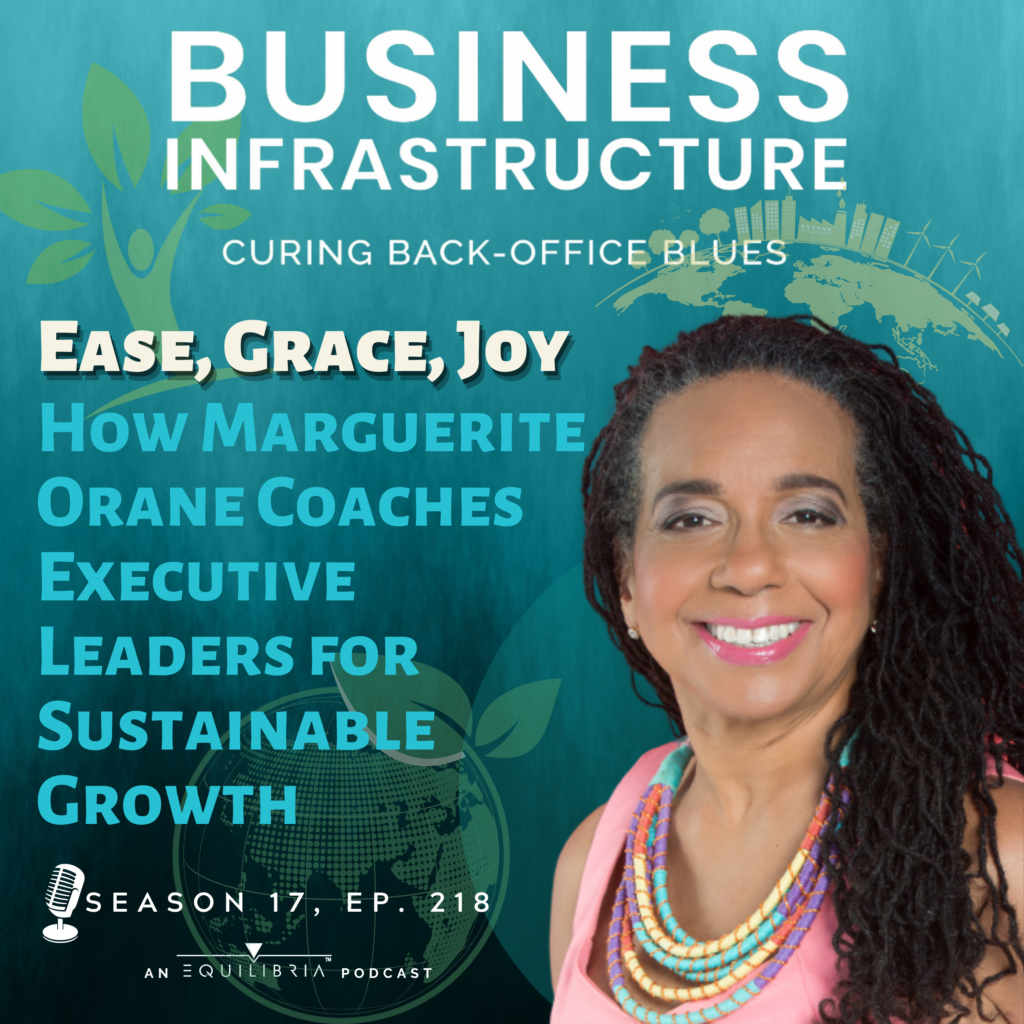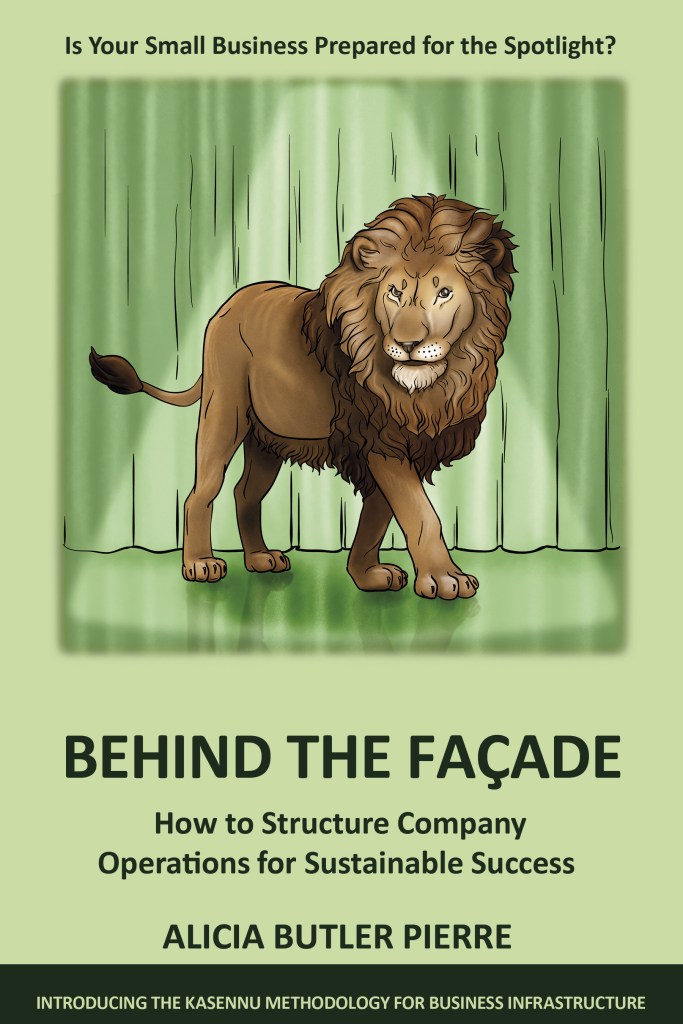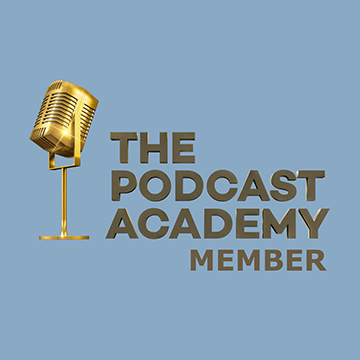Transcript

This episode is brought to you by Equilibria, Inc. the company behind this podcast where we design scale-ready business infrastructure for fast-growing small businesses.
“In February of 2012, I was walking through the Miami airport and I saw the cover of the latest issue of the Harvard Business Review, how to smile a face on the cover, which means I had to stop cause I know smiley faces and the cover was “The Value of Happiness: How Employee Wellbeing Drives Profits.”
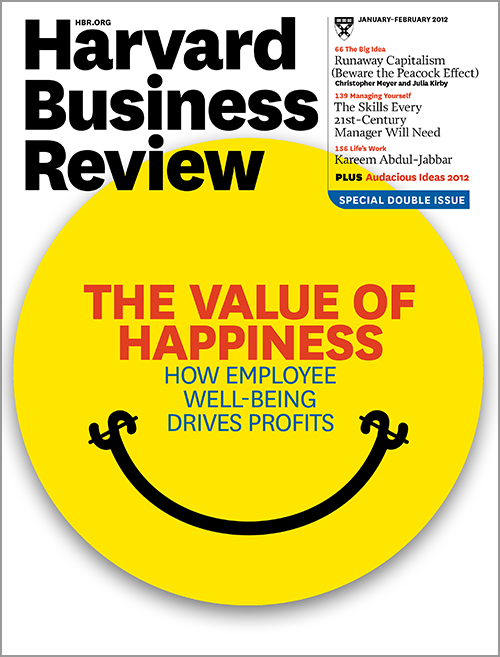
When I looked up the word, “happiness” in the Merriam-Webster dictionary, it defined it as “A state of well-being and contentment. Joy.” It made sense that Marguerite Orane, whose voice you just heard, stopped to take a closer look at that magazine with the big smiley face on it. She’s a joy specialist.
This is the Business Infrastructure podcast – the show where we offer strategies, tactics, and resources to cure back-office blues and to keep your business operating as good on the inside as it looks on the outside. I’m Alicia Butler Pierre and as you’ve probably guessed, this episode is rooted in joy. You see happiness and joy are inextricably linked. But don’t be fooled. This won’t be a hocus-pocus, pie-in-the-sky type episode. The subtitle of that Harvard Business Review magazine was how employee wellbeing drives profits. That’s the angle we’ll be using.
Joy is defined as, “The emotion evoked by well-being, success, or good fortune or by the prospect of possessing what one desires.” And Marguerite Orane is the personification of it. As the CEO of Free and Laughing, Inc., she imbues joy in everything she does, including her executive coaching work. In fact, as you’ll discover, joy is a critical factor for building thriving teams that produce results without sacrificing their well-being in the process.
This is Ep. 218: Ease, Grace, Joy – How Marguerite Orane Coaches Executive Leaders for Sustainable Growth
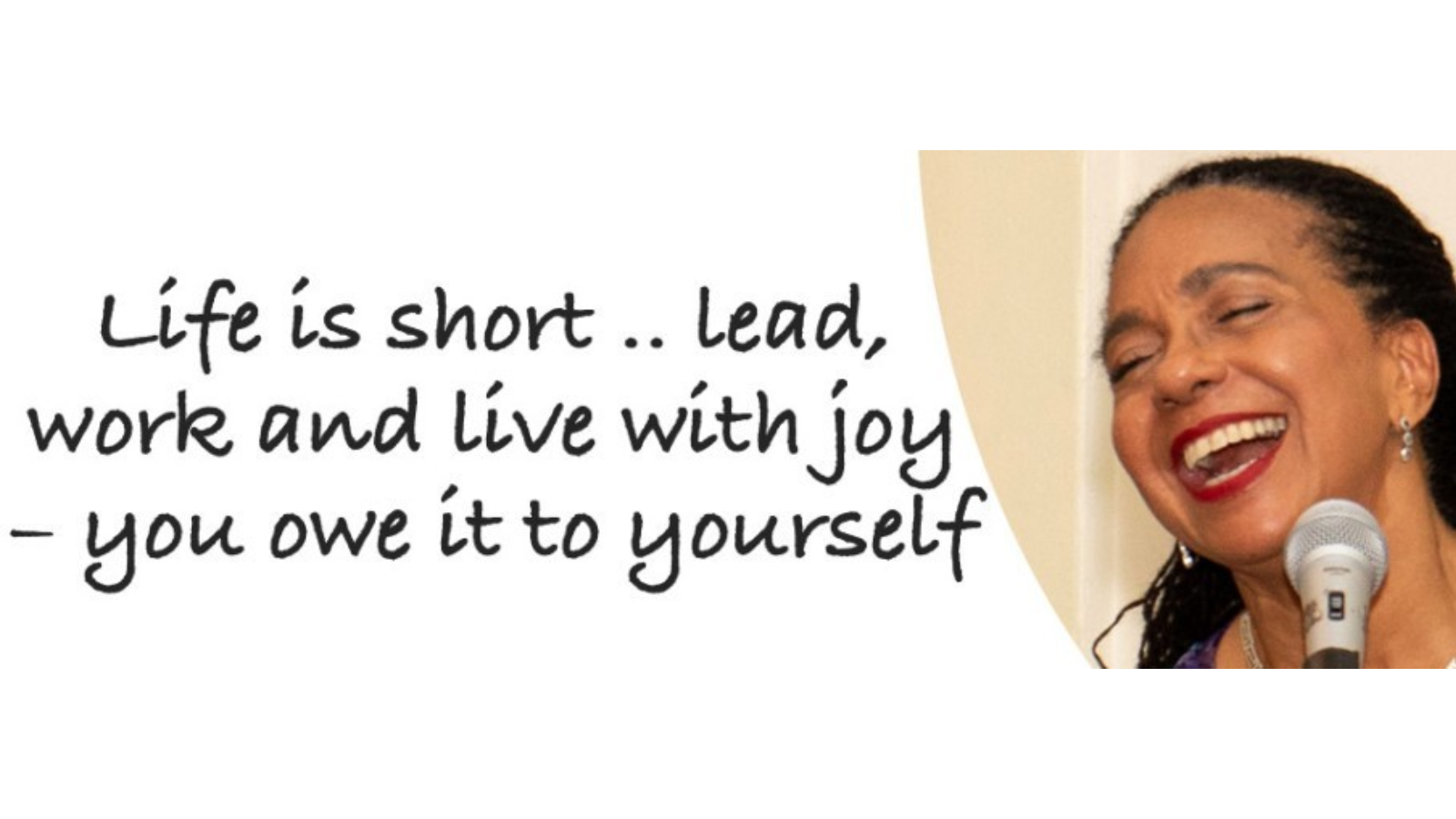
My name is Marguerite Orane and I’m from Jamaica. I grew up in a family business. My parents had a business, mommy and daddy. They started it before I was born. And actually, when I was born, they were going through a very, very tough time in the business and they thought they were going to go bankrupt. And I remember my mom telling me this story, and I’ll probably cry because I cry every time I, I remember that she said, I was such a happy baby, and she would be changing me and taking care of me. And she would just be saying to herself, “They can take everything away from us, but they can’t take you away.” And see I’m tearing up now. And so, when people say, “Well, Marguerite, how did he become this joyful?” I kind of say, “Well, it looks like I was born that way”. But you know what, Alicia? Everybody, I think is born that way.
And she’s right – we’re all born with joy, but some of us seem to lose it as we grow up. But not Marguerite – she’s innately joyful. She grew up alongside her family’s business, working there during the summer holidays and after school. Eventually, she attended the University of the West Indies in Trinidad. She graduated in the late seventies with a degree in management studies, optimistic about the future.
I came back to Jamaica and started to work as a sort of a clerical person, just doing bank reconciliations, very awful, boring manual job. And I’m about six months into it. My brother was eight years older than me, and he said, “Look, I’ve been accepted to do my MBA at Harvard Business School and I’m going, and we need somebody to run the family business.” He had done an amazing job of turning it to our own and scaling it actually.
Marguerite’s brother, who up to the time of this revelation, oversaw running the business. He told her she was the best person to succeed him as leader of their family-owned business. These were big shoes to fill.
Those listeners who have big brothers probably know you don’t tell you big brother, “No.” So I say, “Oh sure!” I was 23. I had zero management experience. I was five feet tall. I still am. I have had, and still have a baby face. You know, I probably looked 16 and the business at the time employed 70 men.

And just like that, an eager and ambitious Marguerite took over as a leader at her family’s manufacturing business. It was an experience that would change everything.
We made wooden doors. And so that was literally my baptism by fire, into the world of leadership and management and getting things done and working through things and solving problems.
How long did you work in that capacity Marguerite?
I was there for about four years, and we decided as a family to sell the business because it’s related to the construction industry, which is very cyclical. And we realized that we were at the peak of a construction cycle and we we’re doing very well. Mommy and Daddy were 60 years old. Everything they had was tied up in the business. So, they had no pension other than a business cause even their family home was mortgaged to the business. And, and so we decided to sell, and that was precipitated also by my own decision to go to Harvard Business School to do my MBA.
The year was 1981 and Marguerite headed north – to Cambridge, Massachusetts in the northeastern part of the U.S. to be exact. Up to this point, she was following in her big brother’s footsteps. But as she would soon discover, going to Harvard would afford her more than just an Ivy League education.
The experience in the family business was traumatic. I probably had post-traumatic stress disorder or something. A lot of family businesses are fraught with all sorts of, family issues. I had a very bad relationship with my father. Actually, when I took over running the business, I was the managing director of the firm, which meant that I was my father’s boss and that did not work so well. And it was very, very difficult to run the business, to have the responsibility of this business, to have the responsibility of the family’s financial wellbeing. And it was also a very difficult time in Jamaica. It was the late 1970s and there was a lot of civil strife. I would call it almost a civil war and it was just very difficult.
There was a lot of stress and negative energy, and the workers would come to work having had to stay up all night, keeping watch in case gunmen came, it was just really toxic. And so, when we sold the business and I went off to Harvard Business School, I was free!
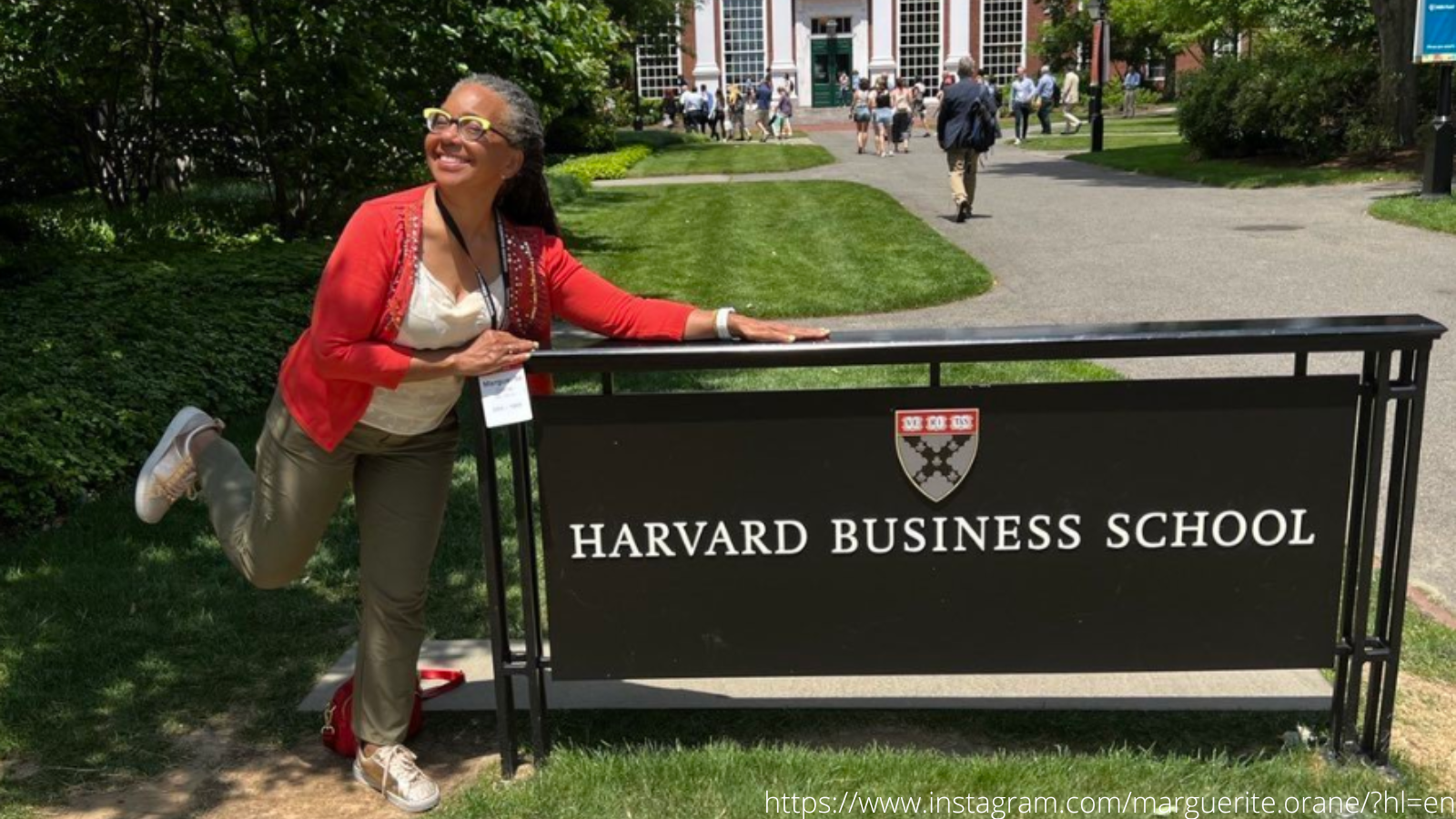
Free to think and free to be. Now that she was over 1,000 miles away from home, she had time to reflect, ponder, press the reset button. Marguerite didn’t know it at the time but taking classes at Harvard would also become her therapy as well. Fortunately, she had leadership experience before beginning her graduate studies. This put her at an advantage since she could analyze what worked, what didn’t, and how she could make improvements in her future career.
I realized that I could really engage in some introspection about how we work. The first thing I needed to do was to process that experience of the family business. And I remember, clearly going to speak to one of my profs about it. It was almost like a counseling session with him, and that was really helpful. And then I also took a course in the second year with the joint course of the Kennedy School in which there were these trade unionists in the class.
And part of the difficulties in the family business was that the workers were unionized, and I went through strikes and lockouts and all sorts of things. And so, I forced myself to sit in this class and begin to see things from their perspective. And that was very healing for me as well. So, I left not just with an MBA, but also a sense of, okay, I have cleared out the stuff I needed to clear out and now I could really apply and lead in the way that I want to lead, which I actually did.
Marguerite went back home to Jamaica, recharged and ready to take on her next leadership role.
I worked for a firm in Jamaica. I started in the financial services company, and I was bored, and they were buying a controlling interest in a manufacturing business – food processing. I didn’t know anything about food, but whatever.
And I asked the chairman, “Hey, you know, I’d like to go and run the company.” And he laughed. And he said, “Do you think you can?” I said, “Of course!”
Unlike her stint running her family’s business, Marguerite wanted and asked for this managerial position. To her surprise, the chairman said yes!
It was the most joyful experience. I just did things my way. It was such a happy place after about a year, because when I got there, there was a very toxic environment as well. And so, I feel really to just double down and just be the leader I wanted to be and create the kind of environment I wanted to. And it was just an absolute joy to see it actually happening. It happened quicker than I thought it would because it happened within a year that this culture, this environment had changed.
I wasn’t CEO then. So, I won’t say I could do whatever I wanted to do, but I could do whatever I wanted to do in terms of how I led. And so, I led it a very inclusive way. I, I sort of broke down the hierarchical autocratic type of structures that were typical of Jamaica and businesses at the time. And in some ways still are. I connected very deeply with the employees, the team members. And I remember one particular situation where we had this janitor called Django. He, an older man, very genteel. And he came to me, and he said, you know, “Ms. (cause that’s how we call each other in Jamaica).”
He said, “The work, the people on the floor being very disrespectful to me, they’re making a mess. They’re not cleaning up there and it’s creating work for me.” And I said, “Okay, Django, you know what? Tomorrow evening, when we’re shutting down the production facility, I am going to call them and together we’re going to clean the floor.” And so, I went and together, we start to clean the floor and things changed after that because I think they saw that his work was a value. So little things like that, that I did are very, very powerful to send a signal that things are different.
What Marguerite did is known as going to the Gemba. In other words, if you want to really understand something at work, go and see it for yourself. No work is beneath you. Every role and every job matters. This simple act was a catalyst for the culture shift at that company. Being a self-described free spirit, she eventually left that job and decided to start her own business to enjoy even more freedom. She recalled having many evolutions of consulting businesses over the years. She even started another family-owned business with her sister at one time. Ultimately, she relocated north again, this
time further up the Western Hemisphere to Toronto, Canada.
When I came to Canada, I actually went job hunting. And I found out pretty quickly that, Harvard MBA or not, I couldn’t get a job. I’m like, okay, well then, I’m going to do what I’ve always done, which is to create my own job. So, I decided to stop the job-hunting quest. And I’ll tell you this little anecdote I was in this interview, and I just sat there.

It was for one of the banks in Canada, and they’re pretty big. And it’s like I had an out of body experience, but I just sat there. And I looked at myself, I was doing the interview, but I was also looking at myself, doing the interview, if that makes sense. And while I’m speaking and answering all the questions the right way, I’m having this conversation in my head and looking at myself saying, “Marguerite, what are you doing? You do not want this job! You do not want to report to this person. There’s nothing about this situation that you like.” And right then and there, I decided I was going to start my own business, my own facilitation and coaching firm.
So, I leave the lady’s office and I go on the train. And by the time I got home, it’s like 45 minutes. I was firm in my conviction. Okay. This is it. So, the next day I checked my email. And there was an email from a client in Jamaica, a former client in Jamaica saying, “Marguerite, would you be available to come to Jamaica in January to facilitate our strategic planning process?” And I just viewed that as all the validation that I needed, that I was doing the right thing. So that’s how Free and Laughing, Inc. started.
The year was 2010 and six years later, Free and Laughing was officially incorporated. By that time, she also had a new catchphrase – Ease, Grace, Joy. A mantra that Marguerite imbues in all her work. I wondered how she came up with that catchphrase.
Can I tell you that I do not remember, honestly, I just know…that one day when I was in Canada. Somehow, I came up with this ease, grace and joy, and I loved it and it just resonated with me and I started to speak about it and people would say, “Oh, I like that! That sounds nice!” And so, I started to get some traction around it.
Traction that not only propelled her business, but her client’s businesses as well.
There’s one thing to, you know, sort of trumpeting a catch phrase, joy there’s another to actually implement it and get it going deep within a firm’s DNA. And there was a decision I actually had to make when I became very intentional about joy at work, which was, do I scale broad, or do I scale deep?
In other, do I flash my message of ease, grace, and joy out there have a con a podcast or whatever it is with, you know, a million people on it, or do I work intimately with a relatively few firms who are really wanting to, dig deep into their culture, have happy employees see the value of joy at work? And I decided to scale by going deep. So, it’s really just scaling my message.
Getting that message of joy just right and then scaling it proved to be difficult. But Marguerite did it. Coming up after the break we’ll learn more about how she goes deep with her clients as she shares a specific time she worked with executives at a small, 20-year-old business to radically transform their culture to make way for scale, profitability, and… joy.
You started your business because you believed you could make a difference. But now you have more demand than you can keep up with and if you don’t get your operations in order soon, you could lose everything you’ve worked so hard to build. The chaos is causing angry customers, bad reviews, failed audits, and more. The need for a unified team with processes they can follow and tools they can use without your presence is apparent. But where can you go for support?

The Smooth Operator masterclass may be the solution you’re looking for. It’s an on-demand, online course that not only teaches you what business infrastructure is, but also shows you how to create it through video demonstrations and access to a private community where you can get even more support. Build a foundation for operational success with a scale-ready framework that’s tried, tested and true. Sign up today at SmoothOperator.courses. That’s SmoothOperator.courses.
You’ve been listening to the story of Marguerite Orane. She’s operated and helped sell a family-owned business, boldly assumed a leadership role at another business, and even started her own businesses, but it was Free and Laughing, Inc. that stuck. Here’s Marguerite…
Turning up joyfully is not something that immediately captures the attention of CEOs because it can sometimes seem frivolous at the beginning. So, I knew I had to gain their trust that I could help them to deliver serious business results. While at the same time, I turned up as the most joyful coach or facilitator or trainer the world has ever seen.
And so that’s what I did. I always turn up joyful – always. I’ve learned how to channel my joy. I mean, it’s not every day that I feel joyful, but believe me, if there’s a workshop or a coaching call going, I am going to be joyful and I shall be genuinely joyful.
And that joyfulness has a way of permeating throughout her work with her clients. For example, one of Marguerite’s clients is a boutique-sized firm that serves as an excellent case study on how joyfulness delivers serious business results.
So, this particular firm I’ve been working with now almost 20 years. So, I actually had started working with them in Jamaica I love working with successful, enterprises because they can experiment and embrace things like joy or the idea of joy to take them to the next level. So, they’re very open to the “Well, what else can we do?” So that’s why I like to work with firms that are already successful. And so, I don’t a lot of work with them gradually. And then maybe in about 2015, 2016, I started to broach this idea of ease, grace, and joy with them. And I wondered, does it really resonate? Wasn’t sure they seemed to have liked it, but I just kept plugging it.
Here’s the interesting thing about us human beings – although we can be positively impacted by something or someone, as a collective, we tend to not be proactive in verbalizing our appreciation or understanding. But Marguerite soon got the sign she was looking for.
And on one visit to Jamaica in about, I think it must have been about 2018. I went into their office, and I asked for their guest WIFI password.

The person, one of the VPs, and she says, “”Margaret, you won’t believe this.” I said, “What?” She said, “It’s ease grace joy!” And I, let me tell you, Alicia. I almost jumped out of my skin and set off fireworks! So, they really have embraced this ease, grace and joy. And the most recent manifestation of that is that I’m now doing my leadership evolution program with them. And I was teaching a cohort on just a few days ago and we were doing a life fulfillment inventory. And each of them did it, looking at how fulfill each area of their lives, you know, spiritual work, family relationships, wealth, and so on.
And nearly all of them said, “I didn’t realize that I was this fulfilled!” I thought, Wow! This is really a manifestation of the work that we have been doing together, that this shift has happened, that they just have soul imbibe in ease, grace and joy that they are fulfilled, not just at work, but in other areas of their lives.
Not only are the employees at this boutique firm fulfilled but last year, 2021, was their best financial year ever! I asked Marguerite was she attributes this to which brings us back to the beginning of this episode when she talked about walking through an airport in Miami in 2012 and noticing a Harvard Business Review magazine about employee wellbeing.
Well, I always say joy was an amazing value propositions, it’s the best value proposition. I still have the magazine. The research that shows that happy employees have 31% higher productivity, their sales are 37% higher and they’re three times more creative. That’s the actual dollar value proposition of happiness and joy at work. So, I always have that Harvard Business Review in my back pocket.
And I really think going back to this particular firm that they have embraced this whole idea of they’re here, not just to make money, but they’re here to serve clients. They’re here to take care of their team members. And they’re 100% for their team members’ happiness because they know it’s going to lead to happier customers. This is going to lead to better financial returns, which it did even in a pandemic.
Though Marguerite can’t disclose the amount of revenue and profit her client made in 2021 nor the nature of their business, suffice it to say they not only did well, but they also thrived, despite the pandemic. It dawned on me that she’s been with this client since their startup days, 20 years ago.
Yeah. Yes, so I’ve been there with them in the trenches. This is the work I did during the pandemic. I wasn’t so much into my message of joy as I was into a message of calm.

I just really worked with them to try to get them calm. Let’s not panic here. I got deeply into reading about the Stoics. So, I read about Marcus Aurelius, the Roman emperor of 2,000 years ago. And the fact that he led through a pandemic that lasted 16 years. It’s so similar to what we were going through. I read up some on the Spanish flu. So, I was able to say, “Okay, this too shall pass. This too shall pass.” So, I moved away a little bit from ease, grace, and joy because people, I sense people weren’t so receptive to that. And instead, just went to, “Let’s just get calm.”
And I also went to a place of helping them, which I do as a matter of course, gratitude. Gratitude is the doorway to joy. When you’re grateful for something, no matter how small you start to open the door to joy. And so even in the darkest of days, what are you grateful for? What are you thankful for? And I think that really helped my clients through this very, very difficult time.
Clearly you don’t get your clients through difficult times without a solid process. Baking joy into a company’s culture requires CEOs to be fully vested. Marguerite started to explain the business infrastructure – that is, the people, processes, and tools that she uses to make this happen.
So typically, I want the CEO to be fully engaged, either working directly with him or her or with his or her blessing and to have access to the CEO. I always consider that the CEO is my client primarily because if the CEO is not bought-in, the CEO is not fully committed, things will not happen. I learned by trial and error. And so, I spend quite a bit of time upfront just getting to understand with the CEO, what what’s keeping him or her awake at night. And then depending on the problems where we’ll be doing some team facilitation, maybe our own strategy or culture, or, coaching of the CEO or, his or her direct reports, that will be typically what will happen. So, I’m very tuned into, Alicia, what their
needs are. This is not about me.
I have my standard process. It can be tweaked depending on their needs. I should mention that I consider myself a solopreneur in that I am the only employee of Free and Laughing, Inc. And that’s deliberate. I tell people I don’t ever want to have another employee in my life, but I’ve assembled a wonderful team of contractors and suppliers that I outsource and collaborate with. And so, depending on what I’m doing, I will engage these people. And I’ll tell you, my team members are as joyful as I am.
And I have processes for each of those. I will have a project admin that manages that process, it just works automatically pretty much I can do it to my sleep. And my, outsourced partners in many areas can also do much of it in their sleep as well. Success is measured by the objectives that we set at the beginning of the assignment. So, for example, with my coaching program, that’s called J.O.Y. – Journey of You leadership coaching – it’s a six-month program. And at the beginning, maybe take the first tour, three coaching sessions. We set some clear objectives for what success will look like at the end of the coaching. We involve the person’s supervisor slash boss CEO, and sometimes their direct reports and peers in helping us to formulate that. Because we had some clear deliverables specified from early on, we’re able to look at it at the end and say, well, did we meet these? We’re constantly checking, certainly there’s a midpoint which I’ll do a check in with the boss to see what changes they have seen. When they’re successful. I am successful.
With such an extensive and diverse career in leadership, coaching, and facilitation, it seems only fitting that Marguerite has written some books.

So, I have two books. The first is called Free and Laughing: Spiritual Insights in Everyday Moments. That was written in 2008. It was a birthday gift for my mother. And it’s, about some of the experience I’ve had in my life and just sharing some of my learnings, mostly personal. In 2018 I published my second book with a similar format. It’s called, Forget It, What’s the Point? Letting Go and Change Joy. My intention with these two books was not to tell people anything or here’s how to do it, but just to share here’s what happened.
In case you don’t have time to read books, that’s okay because Marguerite has other ways you can consume and apply her information. One place to start is her website. There you can read her blog and sign up for her LinkedIn newsletter. You can also learn more details about her coaching programs. There’s one on strategy facilitation where she’s cracked the code on using balanced score cards for small businesses. Her Nourish to Flourish program helps leaders and their teams create and sustain cultures that nourish their people and allow them and the organizations where they work to flourish. And then there’s her signature coaching program: J.O.Y. – Journey of You. You can get links to all this information at BusinessInfrastructure.TV.
Before we wrap up, consider Marguerite’s parting words of advice…
Continue to live, work and lead with joy!
I think I’m going to write that as an affirmation and keep it on my desk. Life no doubt gets challenging. We need to show up as leaders at our organizations whole. Take Marguerite’s story of transformation, enlightenment, and self-actualization to heart. Again, all the resources she mentioned are available at BusinessInfrastructure.TV.

Thank you so much for listening! If you enjoyed this episode, then please leave a five-star rating and review wherever you’re listening.
Our next scale tale features another pandemic success story with lessons rooted in the power of strategic alliances. Subscribe so you that don’t miss it!
Growing and scaling a business is no small feat, but remember, Stay focused. Be encouraged. This entrepreneurial journey is a marathon and not a sprint. Until then, keep operating smoothly as you work to cure your company’s back-office blues.
This podcast was written, produced, and narrated joyfully by me, Alicia Butler Pierre. Audio editing by Olanrewaju Adeyemo. Original score and sound design by Sabor! Music Enterprises.
This is the Business Infrastructure – Curing Back-Office Blues podcast.


